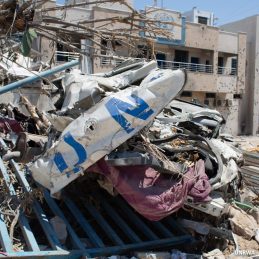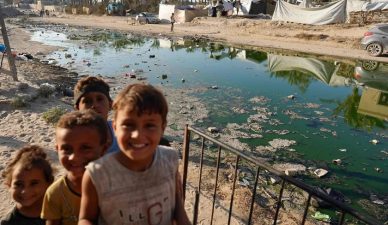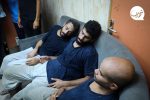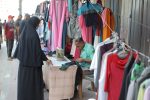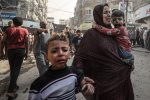GAZA, (PIC)
Under the Israeli bombardment and the suffering of displacement in displacement camps, there are various forms of suffering and oppression in the Gaza Strip, one of which is the suffering of pregnant women during childbirth. Pregnant women in Gaza have been exposed to various hardships since the start of the Israeli genocidal war, ranging from deprivation of healthcare and proper nutrition to the conditions of childbirth and its aftermath.
According to estimates from the Ministry of Health in Gaza, there are about 60,000 pregnant women in the Gaza Strip who are deprived of care and medical follow-up, putting them and their newborns at severe risk.
Multi-faceted fear
The Palestinian woman Dua’a Al-Astaz says that she gave birth to her child a month ago at Al-Awda Hospital in the Nusseirat refugee camp in central Gaza Strip. She describes the night of childbirth as the cruellest due to the aerial bombardment carried out by the Israeli forces around the hospital.
In addition to the labor pains, Dua’a adds in her conversation with the Palestinian Information Center that she was filled with fear as she gave birth to her firstborn under the flames of Israeli shelling.
The suffering does not end there. After giving birth, Dua’a suffers from the inability to provide infant formula for her newborn due to its scarcity in the markets as a result of the suffocating Israeli blockade on the Strip. She confirms that the conditions are extremely harsh.
No capabilities
Dr. Amani Abu Mandil, head of the obstetrics department at Al-Awda Hospital, says that the hospital designated to receive pregnant women for delivery in the central area of the Gaza Strip is small and only contains two beds. It can only perform four cesarean section operations.
She confirms that this is a very limited capacity to cover the central area of the Gaza Strip, which accommodates hundreds of thousands of displaced citizens, especially the Deir al-Balah area, who were forced to go there under the Israeli army directives.
Due to the ongoing aggression, 30 out of 36 hospitals in the Gaza Strip went out of service before some of them partially returned to provide limited health services. The remaining hospitals suffer either from the siege, as is the case with Al-Amal and Nasser hospitals in Khan Yunis, or from immense pressure and lack of resources, as is the case with Abu Yousef Al-Najjar Hospital in Rafah.
A crime at Abu Al-Khair Hospital
Before it went out of service, Al-Khair Hospital in Khan Yunis witnessed a horrific massacre committed by the Israeli occupation army, witnessed by a woman who gave birth to her baby by cesarean section.
Ibtisam Al-Haw told the Palestinian Information Center’s correspondent: She gave birth to her baby by a pre-arranged cesarean section.
She pointed out that at exactly three o’clock in the early morning of Monday, January 22nd, the hospital was subjected to intense artillery shelling that shattered the glass above them. And it was only moments before the Israeli soldiers stormed the hospital, cut off the electricity, and killed everyone they found on the ground floor of the hospital.
She added that the occupation army confined the women in one room and subjected them to meticulous and professional inspection operations, especially since they were women suffering from postpartum and postnatal stages.
She said that the occupation army asked the men present to undress and descend from the upper floors, and they were subjected to severe harassment, and some of them were killed and arrested.
She added that the occupation soldiers asked her and the women with her to leave the hospital.
The woman described the situation as terrifying, especially because she was carrying her newborn who needed an incubator, and only a few hours had passed since the cesarean section operation. She says that amidst the shelling and gunfire, and in the darkness, she left the hospital and hurriedly walked through the city streets until she reached the city of Deir al-Balah, describing it as a night of death.
She explained that the occupation soldiers arrested her husband, who was accompanying her in the hospital, and subjected him to interrogation and mistreatment before releasing him. The journey of death did not end there, as her unnamed baby passed away due to not receiving the necessary incubation and healthcare.
According to human rights data, there has been an increase in cases of miscarriages and fetal deaths due to the Israeli shelling and the use of dangerous weapons such as white phosphorus. The Palestinian Center for Human Rights, Al-Mezan Center, and the Right to Live Foundation stated in a recent statement that childbirth procedures, such as cesarean sections, are being performed without sufficient anesthesia or pain medication, amid a shortage of necessary medical tools and supplies.
The statement emphasized that the greatest threat is malnutrition resulting from a lack of vitamins, proteins, and minerals that enable the body to function properly. Many pregnant women and mothers suffer from malnutrition, putting their lives and the lives of their children at risk.
The story of childbirth in the bathroom is told by a 19-year-old pregnant woman named Nesma Hamou, who is displaced from the Nasser area in northern Gaza Strip. She sought refuge at Al-Shifa Hospital but had to return to her area. She explains, “I fled to Al-Shifa Hospital at the beginning of the war, and due to extreme fear, I experienced symptoms of premature labor. The doctors intervened, and I received proper care. On November 10, 2023, the hospital was bombed, and I had to escape on foot for a long time, which caused extreme fatigue while I was in the eighth month of pregnancy, increasing my fear of losing my fetus, which is my firstborn.”
She continues, “I returned to the Nasser area, where the occupation besieged us for 6 days. I suffered from malnutrition and a shortage of drinking water, which intensified the pains of pregnancy and my fear of losing my fetus. The Israeli army fired phosphorus bombs, and I trembled in terror at the possibility of giving birth to a deformed fetus. Labor pains started in the middle of the night while we were trapped.”
She says, “The desire to give birth to my first child gave me great strength to endure giving birth in the bathroom of my house. The baby fell to the ground, and the umbilical cord was cut by itself.” She confirms that this method of childbirth resulted in her baby having a swollen head for a long time, putting her in constant tension about her health without having doctors to check on her condition.
She adds, “The baby was born weak due to malnutrition during pregnancy, which forced me to give her formula milk, which contradicts my desire to breastfeed naturally.”
Fears
Mahmoud Sabri, a resident of Khan Yunis, tells the correspondent of the Palestinian Information Center: His wife is pregnant and she has a few days left until delivery. He expresses his concern about the circumstances of her delivery, especially since the hospitals in the city, Nasser Complex and Al-Amal Hospital, which is affiliated with the Red Crescent, are under strict Israeli siege.
He says, “I don’t know where she will go to give birth. Isn’t it enough that we live under indiscriminate shelling and deprivation of food, water, and security?”



